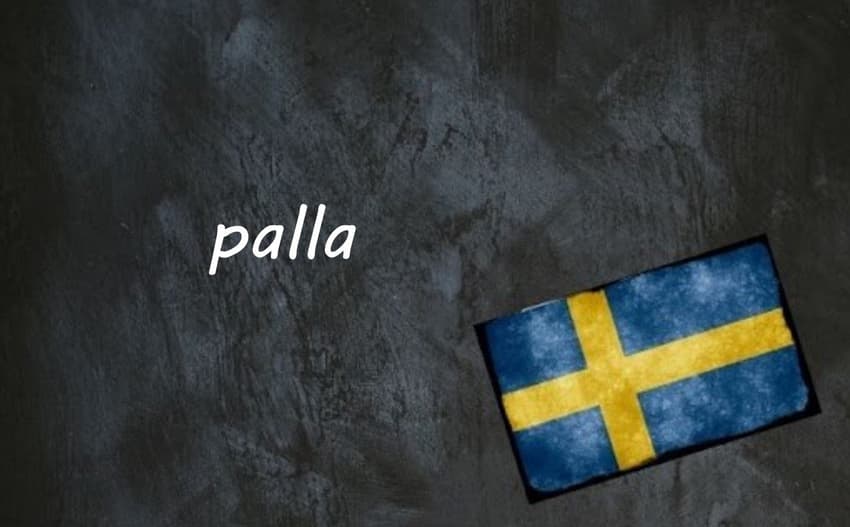Swedish word of the day: palla

Today we're taking a look at a slang term that's quite handy to know. If you can be bothered, that is.
Palla has a few different meanings, but the most common one is "to put up with/to be bothered".
In this way it's similar to the verb orka, which means "to have the energy to", but there are a few key exceptions. If someone says they don't palla to do something, there's a strong indication that this is their subjective opinion, whereas if they don't orka, it can also mean they don't physically have the energy.
For example, if someone says jag ville springa efter tjuven men jag orkade inte (I wanted to run after the thief but I didn't have the energy), it implies they were physically unable to, whereas the sentence jag pallade inte springa efter tjuven (I couldn't be bothered to run after the thief) more strongly suggests the speaker could have done it if they had wanted to.
In recent decades, palla has also evolved into a simple interjection (Palla!), which can be considered a shortening of jag pallar inte and means "Can't be bothered!" Expect to hear this from children and teenagers, and be careful about using it yourself, since it's considered quite rude.
Palla as a verb can also be used more broadly in the sense of "to put up with/to stand/to cope", and it doesn't only refer to people. You could say: webbsidan pallade inte för trycket (the website couldn't put up with the pressure) if a site crashes due to a high volume of users, or fotbollslaget pallade inte pressen (the football team couldn't put up with the pressure).
The verb palla can also be used as a slang term for stealing. In this sense, it's most often used to talk about children, used specifically in reference to fruit picked illicitly rather than shoplifting, and you could translate it as filch, pinch or nick in English. For example: barnen pallade äpplen (the children stole apples).
Examples
Jag pallar inte att berätta det för dig
I can't be bothered to tell you about it
Han pallade inte vänta längre
He couldn't be bothered to wait any longer
Would you like to listen to a daily Swedish Word of the Day podcast? Take The Local's survey to let us know what you think!
Comments
See Also
Palla has a few different meanings, but the most common one is "to put up with/to be bothered".
In this way it's similar to the verb orka, which means "to have the energy to", but there are a few key exceptions. If someone says they don't palla to do something, there's a strong indication that this is their subjective opinion, whereas if they don't orka, it can also mean they don't physically have the energy.
For example, if someone says jag ville springa efter tjuven men jag orkade inte (I wanted to run after the thief but I didn't have the energy), it implies they were physically unable to, whereas the sentence jag pallade inte springa efter tjuven (I couldn't be bothered to run after the thief) more strongly suggests the speaker could have done it if they had wanted to.
In recent decades, palla has also evolved into a simple interjection (Palla!), which can be considered a shortening of jag pallar inte and means "Can't be bothered!" Expect to hear this from children and teenagers, and be careful about using it yourself, since it's considered quite rude.
Palla as a verb can also be used more broadly in the sense of "to put up with/to stand/to cope", and it doesn't only refer to people. You could say: webbsidan pallade inte för trycket (the website couldn't put up with the pressure) if a site crashes due to a high volume of users, or fotbollslaget pallade inte pressen (the football team couldn't put up with the pressure).
The verb palla can also be used as a slang term for stealing. In this sense, it's most often used to talk about children, used specifically in reference to fruit picked illicitly rather than shoplifting, and you could translate it as filch, pinch or nick in English. For example: barnen pallade äpplen (the children stole apples).
Examples
Jag pallar inte att berätta det för dig
I can't be bothered to tell you about it
Han pallade inte vänta längre
He couldn't be bothered to wait any longer
Would you like to listen to a daily Swedish Word of the Day podcast? Take The Local's survey to let us know what you think!
Join the conversation in our comments section below. Share your own views and experience and if you have a question or suggestion for our journalists then email us at [email protected].
Please keep comments civil, constructive and on topic – and make sure to read our terms of use before getting involved.
Please log in here to leave a comment.